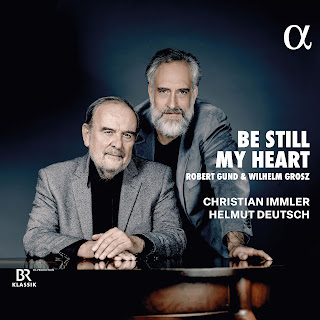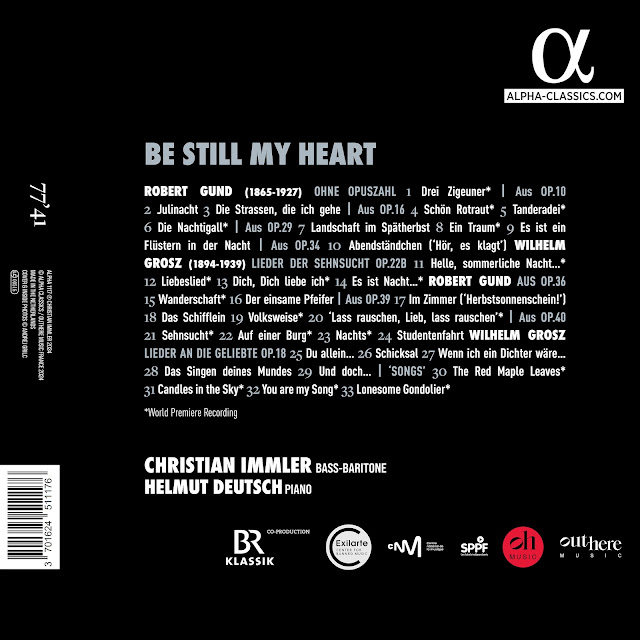Be Still My Heart: songs by Robert Gund and William Grosz; Christian Immler, Helmut Deutsch; Alpha Classics
Reviewed 29 April 2025
Two Vienna-based late-Romantic composers whose songs have disappeared from sight on a disc where the ardent championship of Christian Immler and Helmut Deutsch ensure that we recognise the quality and imagination present. Highly recommended and something of a revelation
As pianist Helmut Deutsch and bass-baritone Christian Immler write in the introductory note to their new album, Be Still My Heart on Alpha Classics, it is difficult to understand why Swiss-born, Vienna-based composer Robert Gund (originally Gound) should be so comprehensively unknown. On this album, Immler and Deutsch perform a wide selection of Gund’s songs alongside those of his younger contemporary William Grosz.
Robert Gund belonged to Brahms’s inner circle – they frequently played through the Liebesliederwalzer together. He was also close to Mahler, became the archivist of the Tonkünstlerverein association founded by Schoenberg, and at Vienna’s illustrious Musikverein he conducted a prizewinning symphony he had composed, and appeared as soloist in his own Piano Concerto. He wrote and published a significant number of songs, and those on this disc stretch from the 1890s through to 1922. His selection of poets seems to veer towards the established and historical, the songs on the disc include Lenau, Kerner, Mörike, Brentano, Herman Hesse, Uhland, Rilke, and Eichendorff.
In terms of style, the young Richard Strauss (born the year before Gund), seems to have been inclined to push the boundaries more, but you can sense Gund exploring the hinterland of late Romanticism. His songs are all well-made, in effect they form a logical extension to the 19th-century Austro-German lied tradition, and perhaps after 1918 it was that very traditional well-made quality which damned them, feeling a little too backward looking in the world of serialism and jazz.
We begin with Drei Zigeuner which seems to evoke Brahms in gypsy mode. The songs then explore what might be termed a lyrical late-romanticism. Some, such was Schön Rotraut and Tanderadei from Opus 16 seem to veer towards the more characterful world of Hugo Wolf, but songs like Landschaft im Spätherbst from Opus 29 (1900) are dark and rather intense. By 1905, Abendständchen from Opus 34 seems to be pushing late-Romanticism towards something almost Expressionist.
His later songs, from Opus 36 (1911) and Opus 39 (1922) include elements that veer towards the more popular with charming dance feel to Das Schifflein, but also from this set Im Zimmer (‘Herbstsonnenschein!’) is pure concentrated magic. His Opus 40 songs, also from 1922, find him mixing melody with harmony that pushes boundaries and occasionally moves into the Expressionist. I don’t think he was ever a composer to really push boundaries, and in our polystylistic age, there is plenty of room for his songs. What he has is the ability to create a mood, an atmosphere via the smallest of gestures. Immler and Deutsch have chosen an intelligent selection of the songs, the disc makes you keen to hear more and more particularly, to hear them live.
The neglect of William Grosz is, to an extent, more easy to fathom. Jewish, he fled Vienna and at his schoolfriend Erich Korngold’s urging, he ended up in the USA where he completely reinvented himself as a popular composer. But Grosz studied with Franz Schreker and we hear nine of his songs which most definitely push late-Romanticism into another realm.
The first of his Lieder der Sehnsucht (from 1926), Helle, sommerliche Nacht. sees us in the haunting world of something like early Berg. Two more songs from this set, Liebeslied and Dich, Dich liebe ich are perhaps more in the conventional line, but the harmony still seems to push and with the final song of the set, Es ist Nacht… we return to that advanced atmosphere.
His Opus 18 songs from 1924, Lieder an die Geliebte are by turns dark, sober and intense, often rather concentrated. All relatively short, these are not outgoing pieces. They set transcriptions of words by the contemporary Turkish poet Dschenab Schehabbüdin Bey (Cenâb Şehâbeddîn) who died in 1934 age 63. They make a powerful set and seem to be well worth exploring, and make you wonder quite what Grosz would have done next. But he belongs to the lost generation, Hans Gal was one of his contemporaries. Composers who survived, but whose careers were disrupted. Grosz turned to light music and the disc ends with four of his English language songs. Delightful things in their way, charming and imbued with longing, yet they make you regret what might have been.
The blog is free, but I’d be delighted if you were to show your appreciation by buying me a coffee.
Elsewhere on this blog
- A genre finding its way: Maurice Greene’s Jephtha reveals different English oratorio before Handel consolidate the form – record review
- More than novelty value: at Conway Hall, the Zoffany Ensemble explores substantial 19th century French works for nine instruments – concert review
- Creating a fun day out as well as broadening the mind: Jack Bazalgette on his first Cheltenham Music Festival as artistic director – interview
- From RVW’s Sancta Civitas & Bliss’ The Beatitudes to Reich’s The Desert Music & Birtwistle’s Earth Dances, plus 19 premieres: the BBC Proms 2025
- Fierce virtuosity & sheer delight: oboist Olivier Stankiewicz, soprano Lucy Crowe, violinist Maria Włoszczowska & friends in a captivating evening of Bach, Zelenka, Handel, Vivaldi – concert review
- Dramatic engagement: Francesco Corti directs Bach’s St John Passion with the English Concert at Wigmore Hall on Good Friday – concert review
- Searching for possibilities: composer Noah Max on his four string quartets recently recorded by the Tippett Quartet on Toccata Classics – interview
- Youthful impulse and power: Mozart’s Requiem from National Youth Choir, Sinfonia Smith Square and Nicholas Chalmers – concert review
- Looking at these modern classics anew: Britten’s Canticles at the Barbican with James Way, Natalie Burch & friends – concert review
- This production, will undoubtedly be remembered for years to come: Massenet’s Werther in Paris with Marina Viotti, Benjamin Bernheim & Marc Leroy-Calatayud conducting Les Siècles – opera review
- Home










